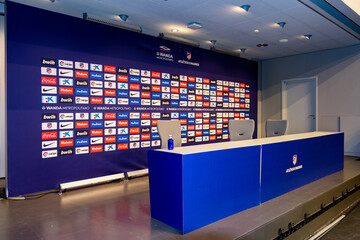In the realm of football, the perennial conversation surrounding club translators and their persistent challenges with media outlets in accurately conveying the words of coaches and players remains a constant. These issues extend beyond mere inaccuracies in translations during post-match or pre-match press conferences, reaching into the realms of behind-the-scenes activities, locker rooms, and player communications. Challenges in translation may lead to critical errors that result in a team’s defeat in specific matches. Media organizations grapple with numerous difficulties when dealing with club translators, and these problems persist without proper oversight, as there is no regulatory control from professional committees over the translators’ work, despite these committees overseeing all press conferences throughout the football seasons.

Over time, a multitude of crises has unfolded. These range from the absence of a professional translator proficient in translating football terminology to decisions by certain coaches who opt not to utilize translators, resulting in impediments that eventually lead to their departure. For instance, Farías, the Brazilian coach of Al-Wasl, chose not to enlist a translator despite his lack of proficiency in English and only knowing Portuguese. Instead, he relied on the fitness coach, Louis, leading to numerous issues between them. Ultimately, Farías departed without achieving significant results, prompting him to advise all coaches working in Arab clubs to enlist the services of a trusted professional translator.
Al-Ahli (Shabab Al Ahli) faced translation challenges during the press conference introducing Olié, with Olié speaking for over 10 minutes while the translator provided abbreviated translations. Additionally, when Al-Ahli encountered initial problems signing the renowned Italian, Fabio Cannavaro, the solution involved turning to the Libyan player, Jihad Al-Muntasir, who spoke Italian after having played for an Italian club. Al-Muntasir continues to serve as the translator in all conferences attended by Cannavaro.
In Sharjah, former coach Caju denied statements attributed to him in “Al-Ittihad.” When confronted with recorded interviews, he asserted that the translator had misunderstood the meaning. Subsequently, the translator left the club at the end of the season. The work of club translators needs to adhere to specific selection criteria, focusing on the translator’s ability to translate football language with all its terms accurately and convey information in a trustworthy manner. The professional committee should actively supervise these translators and establish conditions for their selection in front of clubs. This is especially crucial since the committee oversees press conferences after matches, and committee representatives are present at conferences, some of whom translate for certain coaches.

Abdullah Nasser Al-Junaibi, Vice President of the Professional League Committee, emphasized that the committee’s primary task is to supervise the organization of competitions and closely monitor clubs. The hiring of translators is considered an internal matter for the clubs. Al-Junaibi urged clubs to select experienced translators proficient in accurate football translation to avoid any negative impact on the Emirati league. He emphasized that the media coordinator and translator are prerequisites imposed by the AFC for implementing professionalism. Clubs must provide a translator for AFC matches if any party speaks a different language. These instructions are clearly outlined in AFC regulations, and clubs are well aware of them, requiring strict adherence.
Journalist Kefa Al-Kaabi acknowledged the existence of a crisis among club translators in the league due to the mistakes they make, whether in translating during press conferences or conveying information from the coach to the players. This poses a significant challenge, as these issues can lead to problems between the coach and players and even result in the team’s loss in any given match. Al-Kaabi recounted an incident during Maradona and Pelé’s presence at the opening of the Aspire Sports Excellence Academy in Qatar, where he had to step in due to translation inaccuracies. He stressed the importance of translators having a background in sports, particularly football, to comprehend the terminology used by coaches.

Al-Kaabi called on the Professional Committee to intervene and conduct tests for translators to address the prevalent problems. The issues sometimes escalate to the point where coaches deny statements made in press conferences, leading to potential penalties. He also highlighted the need for better compensation for translators, suggesting that clubs either contract with professional translators who are cooperative but not essential or opt for translators with respectable salaries, ensuring careful selection of the best and most experienced individuals.
Note: This article has been translated from Arabic (Al Etihad News Center)